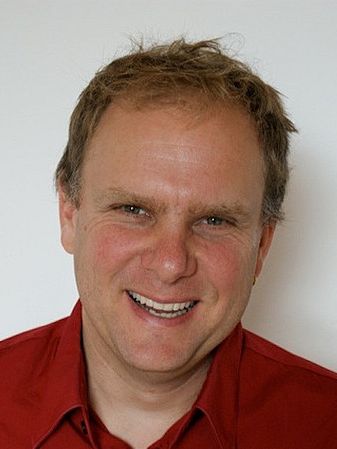Martin Gruber
Dr. Martin Gruber
gruber[at]uni-bremen.de
Martin Gruber ist Ethnologe und Filmemacher mit den Schwerpunkten multimodale Anthropologie, ethnographischer Film, kollaborative Forschung und Multispezies-Ethnografie, sowie Altern und Gesundheit. Martin Gruber habilitierte am Institut für Ethnologie und Kulturwissenschaft der Universität Bremen mit eines Forschung zur Beziehung zwischen Menschen und Honigbienen in Deutschland, Japan und Kamerun. Er studierte Ethnologie an der Universität Hamburg und Visuelle Anthropologie am Goldsmiths College London.
Thematische Schwerpunkte:
Audio-Visuelle Anthropologie, Medienethnologie, Ethnografischer Film, Stadtethnologie, Politische Ökologie, Human-Animal Studies, Multi-Species Ethnography, Bienen
Regionaler Schwerpunkt:
Südliches Afrika, Westafrika, Hamburg, Bremen
https://www.uni-bremen.de/en/kultur/research/research-projects/beecultures
Veröffentlichungen
2023 Fictional Futures: Ethnofiction in Applied Ethnographic Filmmaking. Anthrovision [Online], 10.1 2023. DOI: 10.4000/123e8
2023 Film Review. Swarm Season. Directed by Sarah Christman. Grasshopper Film. 2019. 86 minutes, color. Visual Anthropology Review. DOI: 10.1111/var.12305.
2022 Sharing the Camera. A Guide to Collaborative Ethnographic Filmmaking. Canon Pyon: Sean Kingston Publishing.
2022 The ecology and evolution of human-wildlife cooperation. People and Nature. DOI: 10.1002/pan3.10369 (with Dom Cram et al.)
2022 Safeguarding human-wildlife cooperation. Conservation Letters. 2022; e12886. DOI: 10.1111/conl.12886 (with Jessica van der Wal et al.)
2021 Mehr als ein süßes Hobby: Stadtimkerei. Soziale und kulturelle Dimensionen urbaner Bienenhaltung. Universität Bremen. DOI: 10.26092/elib/1158
2021 Precious/Precarious Images: Cameroonian Studio Photography in the Digital Age, Visual Anthropology 34(3): 214-233. DOI: 10.1080/08949468.2021.1908112
2020 Walking, Memory, Storytelling, Decolonisation. Werkstattbericht: Zwei kollaborative Workshops zur Erprobung von Methoden der Dekolonisierung, Windhoek 2019. Ethnoscripts 22(1): 168-183. open access (link) (with Cordula Weißköppel)
2019 Heroes and Heroines. Online Publication. access here
2019 Les Ruches Coniques d'Adamoua au Caméroun. in Abeilles: Une Histoire Intime avec l'Humanité Regert Martine, ed. Pp 90-91.Paris: Cherche Midi
2019 Honey Hunting and Beekeeping in Adamaoua (Cameroon). Rüdiger Köppe Verlag. Köln. (mit Mazi Sanda) access here.
2018 Hunters and Guides: Multispecies Encounters between Humans, Honeyguide Birds and Honeybees. African Study Monographs 39 (4): 169-187. DOI: 10.14989/236670
2018 Film Review: I am the People (Je suis le Pauple) by Anna Roussillon. American Anthropologist 120 (2). 359-360. DOI: 10.1111/aman.13038
2017 Between Islam and the Sacred Forest. Journal of Anthropological Films 1 (1). DOI: 10.15845/jaf.v1i1.1348
2016 Participatory Ethnographic Filmmaking: Transcultural Collaboration in Research and Filmmaking. Visual Ethnography 5(1). access
2015 Liparu Lyetu – Our Life. Participatory Ethnographic Filmmaking in Applied Contexts. Bremen: Universität Bremen.
2013 Transdisciplinary research and stakeholder involvement. A review of the TFO approach. In: Oldeland, J., Erb, C., Finckh, M., Jürgens, N. [Eds.]: Environmental Assessments in the Okavango Region. Biodiversity & Ecology 5: 195-212. DOI: 10.7809/b-e.00275. (mit Schmidt, L., Domptail, S., Klintenberg, P., Schmiedel, U., Zimmermann, I., Falk, T.)
2012 Henley, Paul: The Adventure of the Real: Jean Rouch and the Craft of Ethnographic Cinema. In: Ethnoscripts 14(1): 197-199.
2010 Film making as an instrument of research communication and capacity development. In: Schmiedel, U., Jürgens, N. [Eds.]: Biodiversity in Southern Africa. Volume 2: Patterns and Processes at Regional Scale. Göttingen & Windhoek: Klaus Hess Publishers: 326-331.
2008 Aufklärungsfilme als Beispiel angewandter Ethnologie? Ethnoscripts 10(2): 184-190.
2007 Platzverweis. Obdachlose in der Hamburger Innenstadt. Saarbrücken: VDM Verlag.
2007 Betroffene von Räumungsklagen und Verbleib von Zwangsgeräumten: Eine ethnologische Untersuchung zu Lebenssituation und Verbleibsalternativen. Münster: LIT Verlag. (mit Waltraud Kokot).
2007 Wald, Fluss, Schlange: Neues Museum für außereuropäische Kunst. Musée du Quai Branly in Paris. Ethnoscripts 9(1): 207-213.
2006 Street Magazine, Social Welfare, Soup Kitchen: The Income Strategies of Urban Homeless People in Hamburg/Germany. Ethnoscripts 8(1): 79-92.
2002 Parallelwelten. Eine Feldforschung über Obdachlosigkeit in der Hamburger Innenstadt. Ethnoscripts 4(1): 61-81.
2002 Gruber, Martin: Cinéma Vérité. Vokus 12(3): 23-31.
2001 Innenansichten. Kultur der Obdachlosigkeit in der Hamburger Innenstadt. Hamburg: Institut für Ethnologie. (mit Waltraud Kokot & Felix Axster).
Filme & Multimedia:
2023 Sensing Bees. Multimodale Webseite. ansehen
2019 Walking Windhoek. Walking, Memory, Decolonising, Storytelling. Interaktive Webseite. ansehen
2018 First Harvest, Japan, 8 min., Universität Bremen ansehen
2016 Between Islam and the Sacred Forest, Guinea, 52 min, ethnofilm. ansehen
2015 Gbaya: Beekeeping and Honey Hunting, Kamerun, 44 min. Universität Bremen ansehen
2013 Our Missionaries, 8 min., Guinea, gruberfilm ansehen
2013 Huchi - Honey, 39 min., Angola, Universität Bremen ansehen
2013 The Secret of Our Environment, 34 min., Botswana, Universität Bremen ansehen
2011 Liparu Lyetu - Our Life, Namibia, 32 min., Namibia, Universität Bremen ansehen
2009 Bridging the Gap, Südafrika, 20 min., BIOTA AFRICA. ansehen
2009 Gesichter des Alters, Deutschland, 66 min., Grassi Museum für Völkerkunde Leipzig. ansehen
2008 Mema Eparu - Water is Life, Namibia, 34 min., Lux-Development.
2007 Wiza Wetu! - Our Forest, Namibia, 53 min., BIOTA AFRICA.
2006 The Future of Visual Anthropology, Deutschland, 23 min., intervention press.
2003 Cultivating Death, England, 23 min., gruberfilm. ansehen
2002 abgehakt, Deutschland, 43 min., gruberfilm. ansehen

